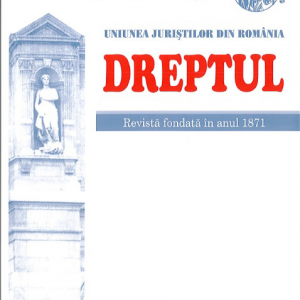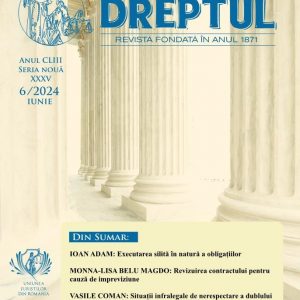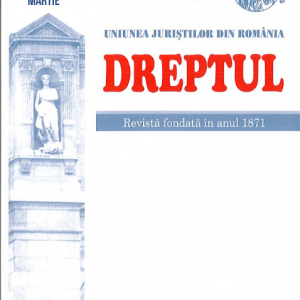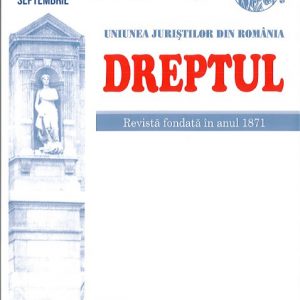-
 The documents under private signature are an important category of preconstituted documents, characterized by the lack of formalism and the freedom of the parties to elaborate them. The form of the document under private signature is sometimes imposed by the law for the validity of the legal operation, and sometimes it is established ad probationem. In the cases where the written form is imposed ad validitatem, the legal document will not produce its effects envisaged by the parties upon its conclusion, unless it has been ascertained in writing. On the other hand, the non-compliance with the form of ad probationem generally brings about the impossibility of proving the legal act with another means of evidence. The written form may be an authentic document or a document under private signature. Also, the electronic document fulfils the condition of form ad validitatem or, as the case may be, ad probationem, if it was generated according to the provisions of the Law No 455/2001 on electronic signature. In principle, the only requirement for the validity of a document under private signature is the signature of the parties or, in some cases, only the signature of one of them. The signature expresses the will of the parties or, as the case may be, of the party to assume the contents of the document they have signed/he has signed. In the cases expressly provided, the legislator also imposes the fulfilment of some special conditions for the validity of the document under private signature. Thus, in the case of documents under private signature which establish the existence of sinalagmatic conventions, „plurality of copies” is required, and in the case of documents under private signature which establisg unilateral obligations (which have as object the payment of a sum of money or a quantity of fungible goods) it is required the formality or mention „good and approved for...”. The content of the document under private signature can be reproduced on any material support (paper, cloth, wood, metal, glass, CD, stick, etc.), in any form (handwritten, typed, printed, lithographed, electronic), in Romanian or in any other language or in a conventional language of the parties. Instead, the signature must be written by hand by the party or parties, not being allowed the typing, lithography or printing, or the replacement by a seal or by fingerprint. By way of exception to this rule, the legislator recognizes the validity of the electronic signature reproduced under the terms of the Law No 455/2001.
The documents under private signature are an important category of preconstituted documents, characterized by the lack of formalism and the freedom of the parties to elaborate them. The form of the document under private signature is sometimes imposed by the law for the validity of the legal operation, and sometimes it is established ad probationem. In the cases where the written form is imposed ad validitatem, the legal document will not produce its effects envisaged by the parties upon its conclusion, unless it has been ascertained in writing. On the other hand, the non-compliance with the form of ad probationem generally brings about the impossibility of proving the legal act with another means of evidence. The written form may be an authentic document or a document under private signature. Also, the electronic document fulfils the condition of form ad validitatem or, as the case may be, ad probationem, if it was generated according to the provisions of the Law No 455/2001 on electronic signature. In principle, the only requirement for the validity of a document under private signature is the signature of the parties or, in some cases, only the signature of one of them. The signature expresses the will of the parties or, as the case may be, of the party to assume the contents of the document they have signed/he has signed. In the cases expressly provided, the legislator also imposes the fulfilment of some special conditions for the validity of the document under private signature. Thus, in the case of documents under private signature which establish the existence of sinalagmatic conventions, „plurality of copies” is required, and in the case of documents under private signature which establisg unilateral obligations (which have as object the payment of a sum of money or a quantity of fungible goods) it is required the formality or mention „good and approved for...”. The content of the document under private signature can be reproduced on any material support (paper, cloth, wood, metal, glass, CD, stick, etc.), in any form (handwritten, typed, printed, lithographed, electronic), in Romanian or in any other language or in a conventional language of the parties. Instead, the signature must be written by hand by the party or parties, not being allowed the typing, lithography or printing, or the replacement by a seal or by fingerprint. By way of exception to this rule, the legislator recognizes the validity of the electronic signature reproduced under the terms of the Law No 455/2001. -
 Important matters of law generate the verification of the legality of the acts of the legal persons of private law specified in the title. Such verification, as revealed by the judicial practice in this matter, involves the relation of the theory concerning the legal acts within the scope of public law to the corresponding theory within the private law. This interdisciplinary approach is necessary in order to correctly identify the conditions of validity related to the legal acts qualified as being acts of authority, given their nature, purpose and addressees.
Important matters of law generate the verification of the legality of the acts of the legal persons of private law specified in the title. Such verification, as revealed by the judicial practice in this matter, involves the relation of the theory concerning the legal acts within the scope of public law to the corresponding theory within the private law. This interdisciplinary approach is necessary in order to correctly identify the conditions of validity related to the legal acts qualified as being acts of authority, given their nature, purpose and addressees. -
 Although the Paulian action is a legal mechanism, in principle very well known, when it comes to its practical application, in order to effectively promote such action, it is very important to have a thorough knowledge of the conditions that must be met for such action both to be promoted and to be allowed. This study is divided into two parts, in which first the general conditions and then the special conditions for the promotion of the Paulian action are presented. Also, in view of the legislative changes brought about by the entry into force of the new Romanian Civil Code, but also by amending the French Civil Code of 2016, we considered opportune a comparative presentation of the novelties brought by the two legal systems.
Although the Paulian action is a legal mechanism, in principle very well known, when it comes to its practical application, in order to effectively promote such action, it is very important to have a thorough knowledge of the conditions that must be met for such action both to be promoted and to be allowed. This study is divided into two parts, in which first the general conditions and then the special conditions for the promotion of the Paulian action are presented. Also, in view of the legislative changes brought about by the entry into force of the new Romanian Civil Code, but also by amending the French Civil Code of 2016, we considered opportune a comparative presentation of the novelties brought by the two legal systems. -
 The article is based on a constant case law of the Constitutional Court of Romania where the expression of “interstitial rule” appears as a leitmotif. Under this rule, any rule of law of the European Union whose content is sufficiently clear, precise and unambiguous, and at the same time proves a certain level of constitutional relevance, will be applied within a compliance control operated by the constitutional court. Therefore, these conditions are examined in detail and also some legal proposition is designed to facilitate the situation of the direct “beneficiary” of such an enforcement – the European litigant.
The article is based on a constant case law of the Constitutional Court of Romania where the expression of “interstitial rule” appears as a leitmotif. Under this rule, any rule of law of the European Union whose content is sufficiently clear, precise and unambiguous, and at the same time proves a certain level of constitutional relevance, will be applied within a compliance control operated by the constitutional court. Therefore, these conditions are examined in detail and also some legal proposition is designed to facilitate the situation of the direct “beneficiary” of such an enforcement – the European litigant. -
 In this study the author analyzes the requirements for the admissibility of provisional release under judicial control and provisional release on bail from the point of view of the Code of Criminal Procedure in force and the new Code of Criminal Procedure, the internal doctrine and the (European) Convention for the Protection of Human Rights and Fundamental Freedoms and the Supreme Court’s case law and practice of the European Court of Human Rights. The general conditions for ordering judicial control and judicial control on bail are also presented - preventive measures stipulated in the new Code of Criminal Procedure, which no longer provides for the institution of provisional release.
In this study the author analyzes the requirements for the admissibility of provisional release under judicial control and provisional release on bail from the point of view of the Code of Criminal Procedure in force and the new Code of Criminal Procedure, the internal doctrine and the (European) Convention for the Protection of Human Rights and Fundamental Freedoms and the Supreme Court’s case law and practice of the European Court of Human Rights. The general conditions for ordering judicial control and judicial control on bail are also presented - preventive measures stipulated in the new Code of Criminal Procedure, which no longer provides for the institution of provisional release. -

-
 The remand on custody and the preventive detention are placed among the most important institutions of criminal processual law. The adoption of the new criminal processual legislation regarding the remand on custody and the preventive detention raises the question of analysing the elements of novelty contained by the new legal provisions, as well as the question of their compliance with the case-law of the European Court of Human Rights.
The remand on custody and the preventive detention are placed among the most important institutions of criminal processual law. The adoption of the new criminal processual legislation regarding the remand on custody and the preventive detention raises the question of analysing the elements of novelty contained by the new legal provisions, as well as the question of their compliance with the case-law of the European Court of Human Rights. -
 Hardship (as grounds for contractual amendment or termination thereof, even in default of contractual provisions in this respect) had not been legally regulated under the former Romanian Civil Code (dated 1864), but only under some special laws. However, during the past two decades, there was shaped in legal doctrine and the Romanian reference jurisprudence a theory of hardship (as shown), which substituted, in part and controversially, the legal deficiency in the matter. This deficiency wore away by the entry into force of the new Civil Code (Law no. 287/2009, republished on July 15th, 2011 and enforced on October 10th, 2011), which, by a single fundamental wording (Article 1271, entitled „Hardship”) regulates the conditions under which the Court may rule, where appropriate, upon the adoption of a contract or even termination thereof „should the performance of the contract become excessively burdensome due to an exceptional change of circumstances that would make manifestly unjust the binding of the debtor to the execution of its duty”. In the study above, the authors make an analysis of the configuration of hardship in the light of Article 1271 under the new Civil Code.
Hardship (as grounds for contractual amendment or termination thereof, even in default of contractual provisions in this respect) had not been legally regulated under the former Romanian Civil Code (dated 1864), but only under some special laws. However, during the past two decades, there was shaped in legal doctrine and the Romanian reference jurisprudence a theory of hardship (as shown), which substituted, in part and controversially, the legal deficiency in the matter. This deficiency wore away by the entry into force of the new Civil Code (Law no. 287/2009, republished on July 15th, 2011 and enforced on October 10th, 2011), which, by a single fundamental wording (Article 1271, entitled „Hardship”) regulates the conditions under which the Court may rule, where appropriate, upon the adoption of a contract or even termination thereof „should the performance of the contract become excessively burdensome due to an exceptional change of circumstances that would make manifestly unjust the binding of the debtor to the execution of its duty”. In the study above, the authors make an analysis of the configuration of hardship in the light of Article 1271 under the new Civil Code. -
 Potrivit art. 342 alin. (6) C.pen., constituie infracțiune și se pedepsește cu închisoare de la 6 luni la 3 ani nedepunerea armei și a muniției la un armurier autorizat în termen de 10 zile de la expirarea perioadei de valabilitate a permisului de armă. Totodată, conform art. 112 alin. (1) lit. f) C.pen., bunurile a căror deținere este interzisă de legea penală sunt supuse confiscării speciale (cu notă parțial aprobativă). În cazul faptei prevăzute în art. 342 alin. (6) C.pen., cu privire la care s-a dispus o soluție de clasare întemeiată pe dispozițiile art. 16 alin. (1) lit. b) teza a II-a C.pr.pen., arma și muniția intră sub incidența confiscării speciale, în temeiul art. 112 alin. (1) lit. f) C.pen., în procedura reglementată de art. 5491 C.pr.pen., în ipoteza în care făptuitorul nu a depus arma și muniția la un armurier autorizat în termen de 10 zile de la expirarea perioadei de valabilitate a permisului de armă. (Înalta Curte de Casație și Justiție, Completul competent să judece recursul în interesul legii, Decizia nr. 10/2019).
Potrivit art. 342 alin. (6) C.pen., constituie infracțiune și se pedepsește cu închisoare de la 6 luni la 3 ani nedepunerea armei și a muniției la un armurier autorizat în termen de 10 zile de la expirarea perioadei de valabilitate a permisului de armă. Totodată, conform art. 112 alin. (1) lit. f) C.pen., bunurile a căror deținere este interzisă de legea penală sunt supuse confiscării speciale (cu notă parțial aprobativă). În cazul faptei prevăzute în art. 342 alin. (6) C.pen., cu privire la care s-a dispus o soluție de clasare întemeiată pe dispozițiile art. 16 alin. (1) lit. b) teza a II-a C.pr.pen., arma și muniția intră sub incidența confiscării speciale, în temeiul art. 112 alin. (1) lit. f) C.pen., în procedura reglementată de art. 5491 C.pr.pen., în ipoteza în care făptuitorul nu a depus arma și muniția la un armurier autorizat în termen de 10 zile de la expirarea perioadei de valabilitate a permisului de armă. (Înalta Curte de Casație și Justiție, Completul competent să judece recursul în interesul legii, Decizia nr. 10/2019). -
 Extensive confiscation safety measure has a narrow enforcement scope, as it can be ordered only for the crimes expressly provided by law. On the other hand, extended confiscation can cover only property or the equivalent thereof, obtained by the convicted person whilst committing, in a specified time period, other crimes for which the law provides for such safety measures. Prerequisite to be met for the enforcement of extended confiscation is the existence of an obvious disproportion between income earned lawfully by the person convicted and the value of goods obtained through criminal activity for which the law provides for this safety measure.
Extensive confiscation safety measure has a narrow enforcement scope, as it can be ordered only for the crimes expressly provided by law. On the other hand, extended confiscation can cover only property or the equivalent thereof, obtained by the convicted person whilst committing, in a specified time period, other crimes for which the law provides for such safety measures. Prerequisite to be met for the enforcement of extended confiscation is the existence of an obvious disproportion between income earned lawfully by the person convicted and the value of goods obtained through criminal activity for which the law provides for this safety measure. -
 The article presents the evidentiary standards in case of the extended confiscation, claiming the necessity to establish the difference between the legal income and the value of assets acquired, also taking into account the expenses made by the accused and their family members, mentioning the assets or sums of money subject to extended confiscation, based on an evaluation report drawn up by an expert, by the indictment.
The article presents the evidentiary standards in case of the extended confiscation, claiming the necessity to establish the difference between the legal income and the value of assets acquired, also taking into account the expenses made by the accused and their family members, mentioning the assets or sums of money subject to extended confiscation, based on an evaluation report drawn up by an expert, by the indictment. -
 This paper analyses the offence of conflict of interests, as incriminated in the new Criminal Code, by comparison with the old regulation, as well as the similar incrimination in the French Criminal Code, the study being illustrated with Romanian and French case law. Likewise, the author formulates some de lege ferenda proposals in order to improve the legislation in the field.
This paper analyses the offence of conflict of interests, as incriminated in the new Criminal Code, by comparison with the old regulation, as well as the similar incrimination in the French Criminal Code, the study being illustrated with Romanian and French case law. Likewise, the author formulates some de lege ferenda proposals in order to improve the legislation in the field.
